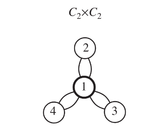Search Results
7/25/2025, 6:48:41 PM
And if so, has it been stated before in the literature?
Let [math]\rho(G)=\prod_{g \in G}o(g)[/math], where [math]o(g)[/math] is the order of element [math]g \in G[/math].
We wish to prove that an elementary abelian group of order [math]p^2[/math] can be uniquely determined by [math]\rho (G)[/math].
Let [math]G[/math] be a group such that [math]\rho(G)[/math] has one distinct prime factor [math]p[/math] and [math]\Omega(\rho(G))=p^2-1[/math].
From lemma 2.6. in https://arxiv.org/pdf/2507.10458, it follows that [math]|G| \leq p^2[/math].
Assume [math]|G| < p^2[/math], then there exists at least one [math]g \in G[/math] such that [math]o(g)[/math] is composite.
Since [math]G[/math] has one distinct prime factor, this element has order [math]p^n[/math]. If [math]o(g)=p^2[/math], then there are at least [math]\phi(p^2)=p^2-p[/math] elements of order [math]p^2[/math] in [math]G[/math], which add [math]2(p^2-p)>p^2-1[/math] prime factors to [math]\rho (G)[/math].
On the other hand, if [math]o(g)>p^2[/math], then by Lagrange's theorem [math]|G|>p^2[/math], contradicting our assumption.
Thus [math]|G|=p^2[/math]. There are exactly two non-isomorphic groups of this order, namely [math]C_{p^2}[/math] and [math]C_p \times C_p[/math], however [math]C_{p^2}[/math] has an element of composite order [math]p^2[/math], so the only possibility is [math]C_p \times C_p[/math].
Let [math]\rho(G)=\prod_{g \in G}o(g)[/math], where [math]o(g)[/math] is the order of element [math]g \in G[/math].
We wish to prove that an elementary abelian group of order [math]p^2[/math] can be uniquely determined by [math]\rho (G)[/math].
Let [math]G[/math] be a group such that [math]\rho(G)[/math] has one distinct prime factor [math]p[/math] and [math]\Omega(\rho(G))=p^2-1[/math].
From lemma 2.6. in https://arxiv.org/pdf/2507.10458, it follows that [math]|G| \leq p^2[/math].
Assume [math]|G| < p^2[/math], then there exists at least one [math]g \in G[/math] such that [math]o(g)[/math] is composite.
Since [math]G[/math] has one distinct prime factor, this element has order [math]p^n[/math]. If [math]o(g)=p^2[/math], then there are at least [math]\phi(p^2)=p^2-p[/math] elements of order [math]p^2[/math] in [math]G[/math], which add [math]2(p^2-p)>p^2-1[/math] prime factors to [math]\rho (G)[/math].
On the other hand, if [math]o(g)>p^2[/math], then by Lagrange's theorem [math]|G|>p^2[/math], contradicting our assumption.
Thus [math]|G|=p^2[/math]. There are exactly two non-isomorphic groups of this order, namely [math]C_{p^2}[/math] and [math]C_p \times C_p[/math], however [math]C_{p^2}[/math] has an element of composite order [math]p^2[/math], so the only possibility is [math]C_p \times C_p[/math].
Page 1
